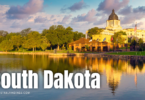Augusta is the capital of the United States state of Maine. It is also the county seat of Kennebec County. It has a population of almost 20,000. This relatively low number makes it the third-least populous state capital in the nation, with the only two with lower populations being the state capitals of Vermont and South Dakota.
Though it is low in population, Augusta is the ninth most populous city in Maine. It is situated on the Kennebec River at the head of tide, and is the home of the University of Maine at Augusta. Augusta is the primary and most important city in the Augusta-Waterville Micropolitan Statistical Area.
While Native Americans lived in the Augusta area for centuries before Europeans came, the first known exploration of the area by Europeans was in September of 1607. A colony called the Popham Colony was set up there, but it quickly fell apart. Colonists could not agree on leadership after family changes among the settlers. After a year at the colony, the first ship built by the English in North America took the settlers back to England. The ship, though small, was quite seaworthy, surviving a hurricane at sea that wrecked other European ships sailing at that same time. It brought the colonists back to England safely.
English settlers ventured back to the Augusta area again in 1628. These were settlers from the previously established Plymouth Colony in Massachusetts, and they went to Augusta to establish a trading post on the Kennebec River. They called their new settlement Cushnoc, after its Native American name, which meant “head of the tide.”
The trading post specialized in furs, and was successful at first. However, revenues soon declined due to an abundance of North American furs on the market from other like-minded settlers. Native American uprisings in the area also caused issues for the settlers. The Plymouth Colony sold the post in 1661, and the post was unoccupied by Europeans for another seventy-five years.
The Native Americans in the Augusta area at this time were the Kennebec tribe, which were an independent branch of the much larger Abenaki tribe. The Kennebec people had friendly relations with the Europeans for much of the 1600s. However, the Abenaki became hostile to the British people who had settled farther north of the Kennebec River. In 1722, the Abenaki and their allies destroyed the Brunswick colony. English forces gained a tenuous control over the Kennebec tribe in retaliation, during the sacking of Norridgewock in 1724.
Because the Kennebec people were a branch of the Abenaki, they felt their loyalties were with the larger tribe. The relationship between Kennebec and English remained tenuous until the middle of the 1700s, when the French and Indian War broke out in the region. During this war, the English built Fort Western near modern Augusta, and it is now considered the oldest surviving wooden fort in the United States. It was intended as a supply station, as well as to defend its territory from the French.
It did its job well, and was still in use two decades later during the American Revolution. During this war, Benedict Arnold used the fort, along with his 1,100 troops, to finalize preparations before marching up the Kennebec River to participate in the Battle of Quebec.
The area of the fort was incorporated as part of the town of Hallowell in 1771. The name was changed in 1797 to Harrington. Finally, in August of 1797, the name was changed to Augusta, after Augusta Dearborn, who was the daughter of local Revolutionary hero Henry Dearborn. Two years later, Augusta was named the county seat of the newly formed Kennebec County. Previously a part of Massachusetts, Maine was set off as its own territory and became a state in 1820. The Maine State Legislature, newly formed, named Augusta as its capital in 1827.
The state legislature met at Portland until 1832, when the new state capital building in Augusta was completed. The city increased in population, so that by 1849, it was designated as a city, rather than as a town. New industries were introduced to Augusta, and it was ranked in 1840 and 1850 as among the top one hundred largest urban areas in the United States. Its top urban heyday declined after this, as new metropolises in the Midwest surpassed Augusta in industry, population, and technology.
The military has been actively present in Augusta since the French and Indian War in the mid-1700s. Troops were garrisoned at Fort Western until the 1790s. An arsenal was built there in 1828 to protect weapons from the British. The city was a rendezvous point for soldiers traveling to the front during the Civil War. In fact, soldiers often camped in the green in front of the state capital building at that point in history.
Another military camp, Camp E.D. Keyes, was built in Augusta in 1862, and it was used during WWI as a mobilization point and training camp for soldiers going to the front (or sometimes fighting the enemy nations from the home front). Camp E.D. Keyes became a Maine National Guard headquarters after 9. The Augusta State Airport was built next to it in 1929. While the new airport made training troops there no longer possible, the camp was still used for administrative and logistical work for the Maine Nation Guard. It still is today.
The steamboat and railroad came to Augusta in the 1800s, with the city receiving regular service for both. Gas lights were installed on city streets in 1859. The telephone was installed in the city in 1880, and the city got its own hospital in 1898. Two movie houses and a film production studio were built in Augusta in the early twentieth century.
Augusta is currently working on a downtown revitalization project, which began in the late 2000s. The goal is to bring private developers to the downtown area to make it more attractive for locals and visitors to use.





